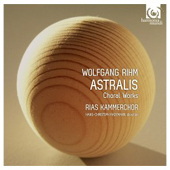
DEFINITIVE RECORDINGS

1) Sieben Passions-Texte (2001-2006)
2) Astralis ("Über die Linie" III) (2001)
3) Fragmenta passionis (1968)
I must admit that German composer Wolfgang Rihm (b 1952) has never, up until now, been a very strong blip on my radar screen.
You know how it is. Years ago I must have heard an inferior example or bad performance of his music which led me to ignore it or avoid listening to more.
Well now that I've heard this impressive new recording presenting premières of some of his choral works, that misplaced opinion has taken a 180º turn
in the opposite direction.
Wolfgang Rihm is a prolific composer who, by the age of 60, has written over 400 works, and yet these choral pieces bear witness to
a composer that sweats over the details and meticulously judges each and every note in relation to the others around it, even if within this atonal context,
any note might fit just as well. For example the opening Sieben Passions-Texte: I. Tristis est anima mea may well start
out sounding like the layered sonic world of a Ligeti, but radically evolves within one minute to become a fully open dynamic and harmonic universe, and
yet retains the small-scale fragility and beauty of a Josquin motet. The seven atonal, detached, and slowly unfolding chords that open Sieben Passions-Texte: III. Velum templi scissum est
are a prime example of how Rihm, by using the text as the nucleus or catalyst for the music, can fill a void with light. On and on, the same can be said
about the masterful handling of the voices, and the inherent beauty and complexity of the harmonic structure of these pieces that rivals its counterparts
from the Renaissance. The main work on this CD, Astralis, by the simple addition of a cello and two timpani, instantly becomes
a darker work that best suits its 21st century creation. The performance notes by the composer himself dictate it be sung as quietly and slowly as possible,
and although it may seem static at times over its 30 minute duration, it's precisely that suspension of time that makes every note pregnant with potential
and meaning.
Even more impressive about this beautifully captured Harmonia Mundi recording, is the complete abandon and devotion brought to
the music by director Hans-Christoph Rademann and the members of the RIAS Kammerchor. Even the contributions
by cellist Dirk Wietheger and percussionist Rie Miyama, as minimal as they are, seem totally commited. The patience
and care that the singers bring to each and very note is instantly obvious, and the atmosphere they add to the subject at hand goes over and beyond
the call of duty. For example, the multi-layered whispers and screams of anger they bring to Fragmenta passionis: II. Da schrien alle
are unbelievably realistic and downright scary. Anyone interested in new music, choral music, or better yet a combination of the two, should hear this.
Jean-Yves Duperron - April 2012